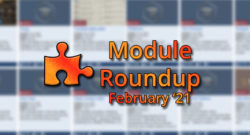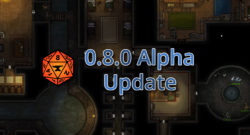Author: brkwsk
Very much alive...
Module Roundup – February ’21
Welcome to the first edition of the monthly Module Roundup! In this series we are going to briefly talk about some modules that came out or got a significant update that month. The exact format is still up in the air and may change over time but for now we are going with three modules in each category. The selection of these modules will be the authors choice and there will always be some awesome modules that won’t make the list. Feel free to leave a comment if you think a module missing or if you really want to highlight a specific module we are happy to work with you to help you out to submit an article of your own. Recently updated Compendium Browser Almost forgotten and left for dead this module recently received a breath of life from Spetzel who took over the project. Compendium Browser provides a better viewing experience for compendiums and this release improves the loading time of the browser and it should no longer crash servers due to high memory or CPU requirements hopefully fixing a long-term issue this module had. Token Attacher You probably have heard about this one or you will now – Token Attacher from KayelGee lets you attach anything to tokens and the attachments will move and behave like the token they are linked to. The module got a very big update this month which includes among other things the ability to attach tokens with each other. This means you can have tokens follow each other or use on token as a mount so you don’t have to rely on older (not maintained) modules anymore for this functionality. This is just the tip of the ice berg there is a ton of more awesome stuff in this module you should definitely check out the video by Baileywiki showing off all the new things you can do with it. Midi Quality of Life Improvements There are a bunch of modules from the author tposney that all have nice synergy with each other and are in constant development and I will do them not the justice they deserve by briefly talking about just one of them. That being said it was an exciting month for the Dungeon Master who likes to automate their games as much as possible. MidiQOL is a module for DND5e that automates a lot of things. It received far too many changes and fixes to list them all but two of my personal highlights are support for concentration automation (depends on DAE and CUB being active) and the ability to automate conditional damage bonuses on hit (e.g. Hunter’s Mark) via macros. New Modules Bug Reporter Now you can cause developers sleepless nights with this module brought to you by Ethck with the help of Calego and cswendrowski. It lets you report bugs and issues you have for a specific module from within the Foundry UI itself. For this to work module developers need to opt-in – which is as easy as adding two lines into your module manifest – and use either GitHub or GitLab as their place to report issues. As a user you won’t need to register a new account for either because the issues will be posted using the League of Extraordinary FoundryVTT Developers accounts. Drag Ruler If you are a fan of Show Drag Distance module but are worried because it is no longer maintained then Drag Ruler by Stäbchenfisch is what you are looking for. It provides basically all functionality of SDD and additionally also provides an API functionality which will make it easier to adopt for other systems than Dungeon and Dragons. And it even works for gridless maps! Autocomplete Inline Properties You like to tinker with items by adding custom properties but you can never remember the data structure? Then cole has you covered with this new module offering auto completion! The autocomplete function will work similar to familiar editors using TAB to complete the current highlighted word in the list or ENTER to confirm the selection and is triggered by either entering @ or pressing a new floating button that will appear on top of the form input. Due to Foundry Hub’s release in February we missed out on highlighting some new modules from January. It would be a shame not include them. So here is a bonus round. Bonus Next Up Recently Kandashi released a bunch of new modules that are all awesome and would deserve a spot here but my favorite is Next Up. This module will open up the character sheet of the current combatant when using the combat tracker and optionally pan towards the token and if that is not enough it also gives you the functionality of the very popular module Turn Marker if you are looking for an alternative. Monk’s TokenBar Another very active developer recently is IronMonk who released among other modules the TokenBar. This one adds all player tokens that are in the active scene in a neat little movable bar providing not only important information like AC and perception at glance but also functions as tool to easily prompt players with roll checks and award experience points. DF Curvy Walls Last but not least a feature that many have wished for a long time is finally possible with this module by flameweave000. It adds bezier curve and ellipse tools to the walls layer that will help you build your maps faster and better. It lets you also choose how many wall segments should be used for the curvy walls to improve performance.
Foundry VTT 0.8.0 Alpha Release
It has been about 7 months since the start of the Foundry Virtual Tabletop 0.7.x release series and now the exciting times of breaking changes and new features will start again with the release of the 0.8.0 alpha! With the warning out of the way we will take a brief look on what this release has to offer and what you can expect going forward with the 0.8.x release series. This release is mainly focused on Next-Gen infrastructure which means its mostly intended for developers and not as much for the regular user. That’s not to say you shouldn’t be excited for this release as it lays the foundations for future features! So WHAT can you expect from this release? Well, first off, expect a lot of BREAKING changes which means some things will no longer work the same way as they did previously. You might ask why make breaking changes in the first place? To answer that, let me allow to quote the creator himself: The main feature of this release is going to be the development of the Common Document Model, which will continue to take shape over the course of the 0.8.x release series. This feature is fairly technical, but the gist of it is unlike before where the codebase was strictly separated into client and server there will be a third set of libraries under the name common which can be used by both the client and the server. Some of the other features in this release are amongst other things the possibility to disable the canvas completely while retaining all other VTT features and thus greatly improving the performance for the people who just do Theater of Mind play, the possibility to have combat encounters that are not linked to a specific scene, and a new icons library for consumables because I for one love giving players the option of gathering 10+ different kinds of nuts! We asked the League of Extraordinary FoundryVTT Developers to comment on this first 0.8.x update for their thoughts and advices. You can find the detailed Patch notes here. If you wish to see an extended preview of these changes, you can check the VOD from the last Twitch live stream where Atropos goes in-depth into the new architecture and what’s to come in the next versions. And this is just the beginning of this new release series. The next release 0.8.1 will focus on overhauling the way audio is played and presented but don’t get too hyped up just yet and expect that it will take another couple releases for a stable one to arrive.
- 1
- 2




